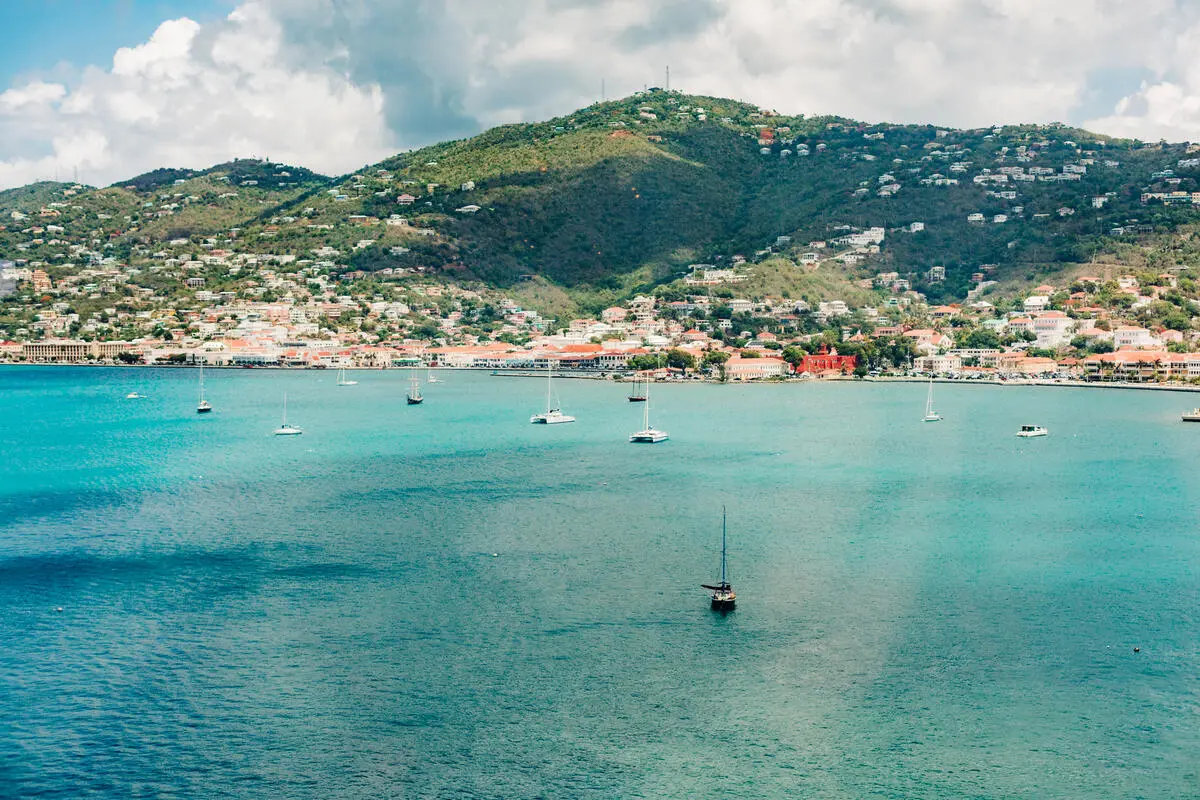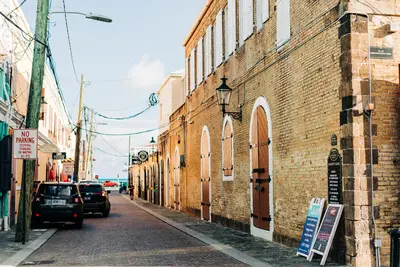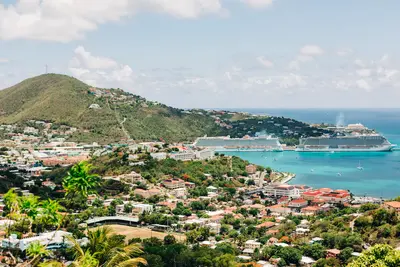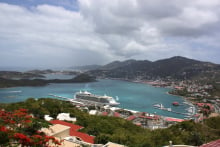One of the most popular Caribbean destinations will be increasing port fees for cruise passengers in 2025.

During a public hearing on December 17, 2024, the Virgin Islands Port Authority announced that cruise ship fees in the St. Thomas–St. John district will increase across three separate categories. Along with higher port dues, guests will also face increased wharfage fees in 2025.
According to the Virgin Islands Port Authority, generated revenue from the higher cruise fees will support necessary dredging and marine operations next year. Technically, the Virgin Island Port Authority is responsible for harbor dredging in St. Thomas, but currently lacks the financial resources to complete the project. Therefore, the increased port fees for cruise ship passengers are necessary to ensure vessels can safely dock and navigate the harbor.

To raise funds, port dues for the St. Thomas - St. John district in U.S. Virgin Islands will be increasing by $3 for each cruise passenger. This means port fees will increase from $6.84 to $9.84 per person, which will be used to directly fund the Charlotte Amalie Harbor Dredging Project. The higher port fee will go into effect by April 1, 2025 for cruise ship guests.
The dredging project will help support larger vessels at the St. Thomas cruise port and allow for improved navigation for vessels. The Charolette Amalie Dredging Project will take approximately two years and is expected to be completed sometime in 2026.
According to NOAA’s National Ocean Service, dredging involves the removal of silt and debris from the bottom of harbors to increase the water depth. “It is a routine necessity in waterways around the world because sedimentation—the natural process of sand and silt washing downstream—gradually fills channels and harbors,” explains NOAA.
Wharfage fee increases begin in January 2025

In addition to hiked port dues, the island is planning to increase wharfage fees for cruise ship passengers starting as early as January 1, 2025.
According to the Virgin Islands Port Authority, the increased wharfage fees will be used to support marine operations and maintain docking facilities. All cruise ships docking in the district will be subject to the increased wharfage fees.
Cruise ships visiting the West Indian Company Dock (WICO) will increase port fees by $0.44 on January 1, 2025. The new fees will increase from $7.80 per person to $8.24 for the WICO dock. Ships that dock at Crown Bay in St. John will pay the same higher fee in 2025, but this change will not go into effect until April 1, 2025.

The wharfage fees will be collected by the West Indian Company (WICO) or the Virgin Islands Port Authority depending on the ship’s docking location. For ships docking at the West Indian Company Dock in Havensight, WICO will collect the fee. On the other hand, the Port Authority plans to collect the fees for ships docking at the Austin ‘Babe’ Monsanto Marine Terminal in Crown Bay and on St. John.
Cruise ship passengers already pay a $1 marine tax for visiting St. Thomas, which remains unchanged in 2025. It’s also important to note that St. Croix will not impose tariffs to cruise ships entering the district. Currently, St. Croix charges a port fee of $3.45 and $3.55 wharfage fee per person.
Why the Virgin Islands Port Authority is increasing fees

St. Thomas is one of the most popular cruise destinations for Eastern Caribbean itineraries. Most of the major cruise lines visit the island year round, including some of the industry’s newest and biggest cruise ships. For example, Royal Caribbean’s brand-new Icon of the Seas regularly visits St. Thomas on its Eastern Caribbean & Perfect Day itinerary.
According to a local report from St. Thomas, Disney Cruise Line, Norwegian Cruise Line and Carnival Cruise Line requested the harbor to be dredged to 40 feet deep in the port’s main channel. This will allow the port to accommodate larger vessels and maintain St. Thomas’ competitiveness for cruise lines as one of the top destinations.
However, no dedicated funding was initially allocated to complete the dredging project. While the U.S. Virgin Islands government has provided approximately $17 million for the effort, this amount falls short of the total required funding. As a result, the increased cruise ship fees will only partially cover the project’s costs.

Local reports indicate that some stakeholders and businesses have voiced concerns about raising port dues for the project, fearing that the higher fees might discourage ships from docking in the district altogether. However, the Virgin Islands Port Authority emphasized that the dredging project is essential for ensuring the long-term sustainability of port operations and accommodating larger cruise ships in the future.
The public information officer for the port authority stated in a released statement, “This significant development will ensure improved access and navigability for cruise traffic, benefiting the local economy and supporting continued growth and development in the region.”
The Virgin Islands Port Authority has also emphasized that cruise ship operations should not be impacted by the dredging projects. With careful coordination, the project should be complete while cruise ship operations continue as scheduled. The port authority is also addressing environmental considerations with the project, such as relocating coral and a historic shipwreck.

Additionally, cruise ships visits are expected to increase by nearly 20% in 2025. With more passengers visiting the Virgin Islands than ever, improved infrastructure and routine maintenance are necessary to ensure smooth operations.
Theoretically, guests could be subject to multiple fee increases if their itinerary docks at both St. Thomas and St. John. This would include the increased port dues, along with higher wharfage fees for visiting both docks.
Other Caribbean destinations raising fees

Rising port taxes have been a hot topic recently for destinations throughout the Caribbean. Just recently, Mexico announced a new tax that was scheduled to begin in early 2025. The immigration tax would be known as the “Non-Resident Fee."
At $42 per person, the significant fee increase for visiting Mexican ports was highly criticized by the cruise lines. In addition, critics questioned why more than two-thirds of the expected revenue from the tax would be allocated to the Mexican Army. Instead, many argued the revenue should be used to maintain port facilities, harbor infrastructure and general port operations.
“If this measure is implemented, it would make Mexican ports of call among the most expensive in the world, severely affecting their competitiveness with other Caribbean destinations,” the Mexican Association of Shipping Agents said in response to the tax.
Other critics included the Florida Caribbean Cruise Association (FCCA), a not-for-profit trade organization that currently represents 23 different cruise lines. The association expressed concerns on behalf of the cruise lines to the Mexican president in a letter, including Royal Caribbean, Carnival Cruise Line, Norwegian Cruise Line and MSC Cruises.

According to a local news source, the FCCA stated that cruise lines were already considering itinerary adjustments to avoid Mexican ports because of anticipated costs increasing. Nearly 10 million passengers could be deterred from visiting the Caribbean destination over the increased cost, explained the association.
Mexico relies heavily on tourism for its economy, including multiple cruise ports across the region. With the new tax implications, the FCCA warned that massive investments from the cruise lines could be at risk. Notably, Royal Caribbean is planning to build Perfect Day Mexico at the Costa Maya port as its next private destination in the Caribbean. The massive investment is scheduled to be complete in 2027.
The significant pushback from the cruise industry caused the Mexican government to defer the new tax by six months. Now, the Non-Resident Fee is scheduled to go into effect on July 1, 2025.




